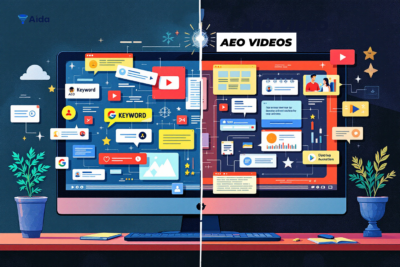
The ChatGPT Search Google Chrome Extension is OpenAI’s innovative tool that integrates real-time web search capabilities directly into your browser. By setting ChatGPT Search as your default search engine, you can perform natural language queries directly from Chrome’s address bar and receive concise, AI-generated answers based on live web data.
If you’re new to the web or building your online presence, it’s crucial to understand that ChatGPT Search connects to Bing’s search index to retrieve results. This means that if your website isn’t indexed in Bing, ChatGPT is unlikely to find or reference your content. In other words, unless Bing recognizes your site, ChatGPT might not know anything about you—an important consideration for businesses and creators focusing on Answer Engine Optimization (AEO).
Are you curious about whether AI platforms like ChatGPT, Gemini, Grok, or Perplexity will mention your topic?
The AI Mention Ranker evaluates your topic’s visibility and calculates the probability of it being referenced by AI systems. This innovative tool helps you measure your relevance in the AI-driven search landscape.
Created by AIDA Framework
Explore the tool further at: AI Mention Ranker
Key Features of the ChatGPT Search Extension
What makes ChatGPT Search different from traditional search engines?
ChatGPT Search stands out because it doesn’t just display a list of search results—it delivers direct answers to your questions. Its key features include:
- Natural Language Queries:
You can type your queries conversationally, like “What’s Tesla’s stock price today?” or “Who won last night’s NBA game?” No need for complicated keywords—just ask as you would in a conversation. - Real-Time Information Access:
ChatGPT pulls up-to-date data on topics like sports, news, weather, and stocks, offering live, relevant answers. - Source Attribution:
Every response includes links to original sources, such as articles or blogs, ensuring transparency and allowing you to explore more deeply. - Search Engine Integration:
The extension replaces your current search engine with ChatGPT Search, making Chrome’s address bar your direct line to ChatGPT’s AI-powered responses. - Bing-Based Search Results:
ChatGPT Search relies on Bing for its web indexing, which means its knowledge is limited to what Bing has indexed. If your website isn’t visible on Bing, ChatGPT won’t surface your content in answers.
How Do You Install ChatGPT Search on Google Chrome?
Setting up ChatGPT Search is simple and only takes a few steps:
- Visit the Extension Page:
Go to the ChatGPT Search extension page on the Chrome Web Store. - Install the Extension:
Click the “Add to Chrome” button to install the extension. - Set ChatGPT Search as Default:
Once installed, the extension will prompt you to set ChatGPT Search as your default search engine. Accept the prompt to enable it in your Chrome address bar. - Start Searching:
Type your query directly into Chrome’s address bar, and ChatGPT will deliver concise, AI-driven answers based on live web data.
Who Can Use ChatGPT Search?
Is ChatGPT Search available to all users?
Human Response: Not yet. Currently, ChatGPT Search is available to:
- ChatGPT Plus subscribers
- Team accounts
- SearchGPT waitlist members
OpenAI plans to expand access to Enterprise, Education, and Free-tier users in the coming months.
How Does Bing Indexing Affect ChatGPT Search Results?
Why does Bing indexing matter for ChatGPT Search?
ChatGPT Search depends on Bing’s search index to fetch web data. If your website isn’t indexed by Bing, your content won’t appear in ChatGPT-generated answers.
For businesses and content creators, this means optimizing for Bing is just as critical as optimizing for Google when pursuing Answer Engine Optimization (AEO). To ensure ChatGPT can reference your site:
- Submit your website to Bing Webmaster Tools.
- Ensure your content adheres to Bing’s SEO guidelines, such as proper use of meta tags, high-quality backlinks, and a mobile-friendly design.
- Regularly monitor your Bing search rankings to identify indexing issues.
Without Bing visibility, you risk being invisible in ChatGPT’s responses, no matter how relevant your content is to user queries.
Why is ChatGPT Search a Game-Changer for Browsing?
How does ChatGPT Search compare to traditional search engines?
ChatGPT Search redefines the browsing experience by offering human-like, contextual answers instead of traditional lists of search results. Here’s how it excels:
- Answer-First Approach:
ChatGPT provides immediate answers rather than forcing users to sift through search results. - Efficient Research:
Need quick information? ChatGPT saves time by summarizing content and pointing you to relevant sources directly. - Transparency and Trust:
Each answer is accompanied by clickable links, allowing users to verify information and explore original sources. - Enhanced User Experience:
Its natural language capabilities make searches feel more intuitive, bridging the gap between humans and machines.
However, the reliance on Bing indexing means businesses need to think beyond Google SEO strategies to ensure visibility. This makes Answer Engine Optimization (AEO) critical for reaching ChatGPT Search users.
What’s Next for ChatGPT Search?
Is OpenAI planning any improvements or expansions for ChatGPT Search?
Yes, OpenAI has big plans for ChatGPT Search. In addition to expanding availability to free-tier and enterprise users, OpenAI is likely to improve:
- Search Engine Coverage:
While it currently relies on Bing, OpenAI could integrate more search engines in the future, potentially enhancing the diversity and accuracy of results. - Deeper Contextual Understanding:
Expect refinements in how ChatGPT summarizes complex topics, making it an even better tool for research and learning. - User Feedback Loops:
OpenAI will likely continue incorporating user feedback to improve the extension’s functionality and accuracy.
Final Thoughts: Why ChatGPT Search Matters
Human Question: Why should users and businesses care about ChatGPT Search?
Human Response: ChatGPT Search represents the future of search by blending real-time web information with natural language AI. For users, it offers faster, more intuitive browsing experiences. For businesses, it opens new opportunities to connect with users through AI-driven answers.
However, the reliance on Bing indexing is a game-changer for businesses that haven’t optimized their sites for Bing. If your content isn’t visible on Bing, ChatGPT might not talk about you—regardless of how well-optimized you are for Google.
To thrive in this evolving landscape:
- Focus on Bing SEO alongside Google SEO.
- Embrace Answer Engine Optimization (AEO) to align your content with AI-driven platforms like ChatGPT.
- Stay updated on OpenAI’s developments to ensure your strategy adapts to new technologies.
Ready to explore a smarter way to browse? Download the ChatGPT Search Extension and see how it transforms your search experience today!
FAQs About ChatGPT Search (Not Widely Covered Online)
If your website isn’t ranking on Bing, focus on submitting your site to Bing Webmaster Tools, optimizing for Bing-specific SEO factors (like schema usage and crawlability), and ensuring content is aligned with Bing’s ranking guidelines. This ensures ChatGPT Search can find and integrate your content into its AI-driven answers.
Yes, ChatGPT Search can provide hyperlocal results, but only if Bing has indexed the relevant local business websites or event pages. For local businesses, ensuring that their information is indexed on Bing and optimized with local SEO tactics, like listing on Bing Places, is critical to appearing in such searches.
ChatGPT relies on Bing’s ranking algorithms to retrieve authoritative sources, combined with its own AI logic to summarize and present answers. If two sources conflict, ChatGPT may cite both or prioritize the source with stronger domain authority, credibility signals, and alignment with E-E-A-T principles (Experience, Expertise, Authoritativeness, Trustworthiness).
Currently, ChatGPT Search does not display ads in its responses. This creates a more organic user experience, allowing businesses to compete purely on the relevance and quality of their content. However, this may evolve as OpenAI monetizes its search platform in the future.
Indirectly, yes. By using natural language queries like “Who are the top providers of [industry keyword]?” or “What are the best


Comments